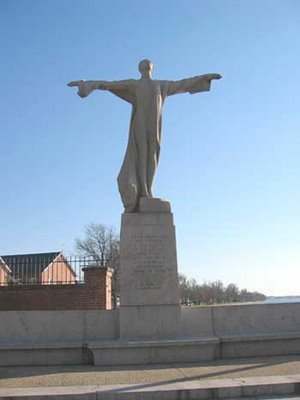Duped by Da Vinci?

So in case you have not noticed, Dan Brown has become a very rich man. I have read that he has sold over 40,000,000 copies (translated into 44 languages) of his latest novel, THE DA VINCI CODE; not to mention the movie coming to the big screen in a couple of weeks, I believe.
Why is his book so popular? Well, I have read the book and all I can say is that he is a literary genius. I picked the book up on a Saturday afternoon at the Barnes & Noble by my house, and I finished it sometime the following morning. It is simply a book that is very hard to put down. Vince Flynn, author of Separation of Power, said “THE DA VINCI CODE sets the hook-of-all-hooks, and takes off down a road that is as eye-opening as it is page turning. You simply cannot put this book down. Thriller readers everywhere will soon realize Dan Brown is a master.”
What has been “eye opening” for me is the number of Christians I have read about who have seemingly begun to question the Bible, the historical Jesus, and their faith as a result of this book. It makes me want to scream, LADIES AND GENTLEMEN THIS IS A FICTION NOVEL. Sadly, Dan Brown does nothing to help in this regard. Interestingly, right at the beginning of the book he says FACT: … “All descriptions of artwork, architecture, documents, and secret rituals in this novel are accurate.”
Really? Hold on just one minute. All documents in this novel are accurate? Well, except of course the Bible!
I mean after all does not the story hinge on the following “facts”:
1. JESUS NEVER CLAIMED TO BE GOD.
4. JESUS WAS MARRIED TO MARRY MAGDALENE.
5. THEY HAD A CHILD.
6. THE HOLY GRAIL IS NOT THE CHALICE OF THE LAST SUPPER, BUT THE ROYAL BLOOD LINE FOUND IN THEIR OFFSPRING.
7. THE NEW TESTAMENT IS A PRODUCT OF MEN WHO WANTED TO ACHIEVE A POLITICAL AGENDA.
8. THEREFORE, JUST ABOUT EVERYTHING WE HAVE BEEN TAUGHT CONCERNING JESUS IS ONE BIG COVER UP!
Consider some of the things Brown says concerning the Bible.
1) “The Bible is the product of man, my dear. Not of God. The Bible did no fall magically from the clouds. Man created it as a historical record of tumultuous times, and it has evolved through countless translations, additions, and revisions. History has never had a definitive version of the book” (231).—Man there is a lot of straw in this statement!
2) “Jesus Christ was a historical figure of staggering influence, perhaps the most enigmatic and inspirational leader the world has ever seen…Understandably, His life was recorded by thousands of followers across the land…More than eighty gospels were considered for the New Testament, and yet only a relatively few were chosen for inclusion—Matthew, Mark, Luke and John among them…The Bible, as we know it today, was collated by the pagan Roman emperor Constantine the Great” (231).—I think he needs to check his facts!
3) “Fortunately for historians…some of the gospels that Constantine attempted to eradicate managed to survive. The Dead Sea Scrolls were found in the 1950’s hidden in a cave near Qumran in the Judean desert” (234).—I think he should check his facts again!
This is just a taste of what you will read when you read Dan Brown’s latest. The sad thing is that many people think that Dan Brown has discovered something new! Reading this book was a reminder to me why we need to do apologetics.
First, we do apologetics because we are Commanded to—1 Peter 3:15 says we must always be ready to make a defense of the faith, Jude 3 says contend for the faith, Philippians 1:7 says we are partakers in defense of the gospel. Doing apologetics is not a suggestion, it is a command. Second, we do apologetics because we need to Answer false teaching—2 Corinthians 10:5-6 says we destroy argument and lofty opinions raised against the knowledge of God, Colossians 4:5-6 says we are to conduct ourselves wisely toward outsiders so that we may know how to answer each person, 2 Timothy 2:24-25 says that the Lord’s servant must correct his opponents. Third, we do apologetics because Reason demands it—In Isaiah 1:18 God says “Come now let us reason together”, Jude 10 says don’t be like unreasoning animals, Matthew 22:37 says to love God with all of your mind. Fourth, and finally, we do apologetics because we need to Save Christianity from attack. If you do not think that Christianity is under attack, just read THE DA VINCI CODE.
And remember the words C. S. Lewis told us in the Weight of Glory,
To be ignorant and simple now, not to be able to meet the enemies on their ground, would be to throw down our weapons and betray our uneducated brethren who have, under God, no defense but us against the intellectual attacks of the heathen. Good philosophy must exist, if for no other reason, because bad philosophy needs to be answered.Read more





